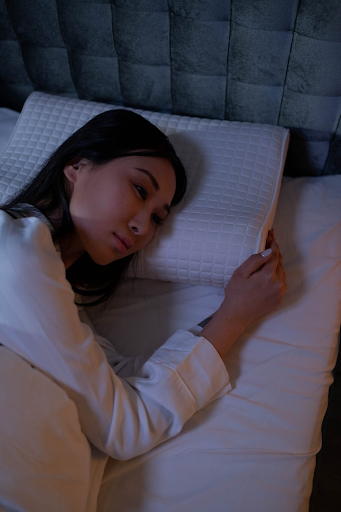Insomnia is a condition in which an individual has difficulty falling or staying asleep. This can have massive effects on both mental and physical health, especially for teenagers. Teenagers ideally need 8-10 hours of sleep for optimal health and mental function, whereas adults need only 7-9. Additionally, teenagers may need to wake up earlier than many adults, since the average work day starts at 9 a.m. and many schools start around 7:30 a.m. or earlier in some cases. Unfortunately, there are not many options when it comes to treating insomnia.
The issue with insomnia is that it is a vicious cycle. When someone goes to bed, and they try to fall asleep with no success, they begin to get frustrated and stressed out about the fact that they cannot fall asleep. This stress leads to them taking even longer to fall asleep and the cycle repeats. This leads to a lack of energy and focus the next day, leading to a decreased quality of school work and overall happiness.
Unfortunately, there are few treatment options for insomnia. Melatonin is often recommended, however, even the strongest version of this supplement is often not strong enough for many people. Stronger sleeping medications such as triazolam, estazolam, temazepam, etc.,are not allowed to be prescribed to people under 18. There are other suggestions to help fall asleep such as limiting screen time before bed, reading before bed, and exercising, but many find that these do not make a significant difference in their ability to fall asleep.
Insomnia often coincides with mental health problems such as anxiety and/or depression. When people are busy all day, they may find that when they try to fall asleep they cannot stop having thoughts of anxiety about the next day, or overthinking scenarios that happened that day since they have nothing to distract them. People with insomnia feel as if they can not shut their brain off, and often feel the sensation of their body being tired, but their brain not allowing them to fall asleep. These thoughts of anxiety can increase heart rate and cortisol levels, which is the opposite of what needs to happen to fall asleep.
Once someone cannot fall asleep, they may give up entirely and go on their phone because they know they will not be able to sleep anyway. The blue light from the phone, as well as the dopamine it provides, makes it even harder for the brain to relax which again causes their insomnia to worsen.
Some parents may not believe their kids when they say they cannot fall asleep because they might not know what it is like to struggle with that issue. In addition, if a student does worse on a test due to lack of sleep, it does not seem like a valid excuse since there is technically no way to prove if that happened or not.
Insomnia is a very frustrating condition in several ways. It often seems like there is no hope for achieving the ability to sleep normally, and it can have effects on school work, mental health, and overall quality of life. Of those with insomnia, teenagers are often the ones who suffer the most since they have to wake up earlier than some adults and do not have access to prescription medication. Hopefully, in the future, there will be more effective strategies to treat insomnia in teenagers, the population it affects most strongly.




















Joana • May 23, 2024 at 7:48 am
You have some really good information in this topic, you provide excellent points. Good job with your wiring!
B • May 22, 2024 at 7:59 am
very true and relatable.
Amauri Ciriaco • May 20, 2024 at 10:25 am
As a person who doesn’t know if they have insomnia or not it is very hard to go about my day when I rarely get any good sleep. On a day to day basis I sleep between 1-4 am and some nights when I really struggle I go to bed at 6 am and wake up at 6:30 am the same morning for school. This leads me to be tired during my school day and not allowing me to work to my full potential because I am always drowsy and tired. A good point made is that parents do not believe their kids, My dad doesn’t believe I stay up that late and if he does he blames it on the fact that I have my phone with me at night so some nights I leave my phone in my drawer and lose track of time staring at the ceiling trying to fall asleep.
Amauri Ciriaco • May 20, 2024 at 10:17 am
As a person who doesn’t know if they have insomnia or not it is very hard to go about my day when I rarely get any good sleep. On a day to day basis I sleep between 1-4 am and some nights when I really struggle I go to bed at 6 am and wake up at 6:30 am the same morning. This leads me to be tired during my school day and not allowing me to work to my full potential because I am always drowsy and tired. A good point made is that parents do not believe their kids, My dad doesn’t believe I stay up that late and if he does he blames it on the fact that I have my phone with me at night so some nights I leave my phone in my drawer and lose track of time staring at the ceiling trying to fall asleep.
Katherine • Jan 29, 2024 at 9:52 am
Really good! I’m sure many kids can relate.